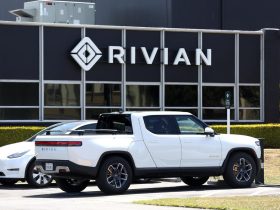SpaceX is an amazing firm by many metrics: Valuation, reusable rockets, astronaut transport, and Wi-Fi for Ukraine. One metric that might fly under the radar is capacity. No one can match SpaceX’s ability to carry payload to orbit. It’s a huge scale advantage that Elon Musk’s space company is building on.
On Sunday, United Launch Alliance, or ULA, the 50/50 space launch joint venture of
Boeing
(ticker: BA) and
Lockheed Martin
(LMT), sent an Atlas V rocket into orbit carrying the SILENTBARKER mission. That is a joint mission for the National Reconnaissance Office and U.S. Space Force to “improve space domain awareness.”
The third time was a charm. The second attempt was called off Saturday after an issue was found during a “prelaunch ordnance circuit continuity check.” The first attempt was scrubbed for weather. It’s tough to launch in a tropical storm.
A replay of the launch can be watched here.
Launches get scrubbed. That isn’t a surprise. Space requires incredible precision and caution. Still, ULA has now flown twice in 2023 after flying eight times in 2022.
SpaceX has flown more than 60 times so far in 2023 after flying more than 60 in 2022.
SpaceX has a huge lead even though ULA is no space slouch. It’s launched more than 150 missions and calls itself “the nation’s most experienced and reliable launch service provider.”
It might have to cede the title of “most experienced” to SpaceX, which has launched more than 260 times. Excluding, missions flown for itself to put Starlink satellites into orbit, SpaceX has also completed roughly 150 to 160 missions for third-party customers, including taking astronauts to and from the International Space Station in a reusable space capsule.
Boeing
and ULA also have a contract with NASA to take astronauts to the space station, but Boeing’s Starliner space capsule isn’t fully certified yet. Boeing and SpaceX were awarded the initial contract for crew transport at the same time in 2014.
The Starlink satellites and those missions definitely count for SpaceX. There are roughly 4,000 Starlink satellites orbiting Earth, providing space-based Wi-Fi for prices starting at about $120 a month. ULA is also in the space-based Wi-Fi game. It’s launching satellites for
Amazon.com’s
(AMZN) competing Wi-Fi business called Project Kuiper. ULA is slated to launch a “protoflight” for Kuiper later in September.
Capacity will eventually be an issue for Kuiper though as it tries to catch Starlink. It’s contracted with three space launch providers to deliver satellites: Jeff Bezos’ Blue Origin, which hasn’t conducted an orbital flight yet, ULA, and Europe’s Arianespace.
Ariane is a joint venture between
Safran
(SAF.France) and
Airbus
(AIR.France). A contract for 18 Kuiper launches signed in 2022 was Arianespace’s largest contract ever. SpaceX has launched 18 missions in the past 48 days.
ULA tells Barron’s it is expanding its capacity to meet the needs of its customers. It’s going to have to go a long way, however, before it, or any group of providers, can match the sheer launch capacity of SpaceX.
Elon Musk’s rocket company is going to remain the key gatekeeper to space for a long time.
Write to Al Root at allen.root@dowjones.com
Read the full article here












Leave a Reply